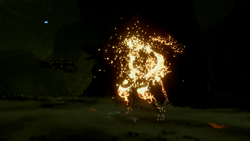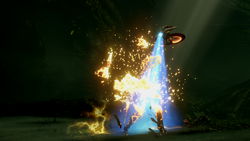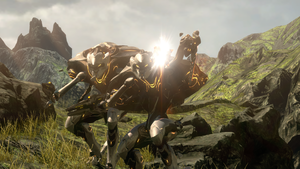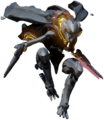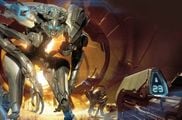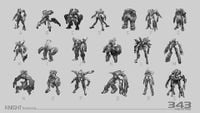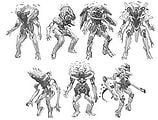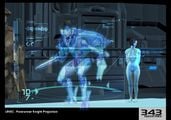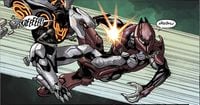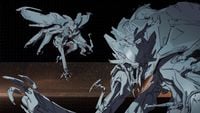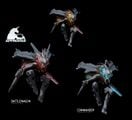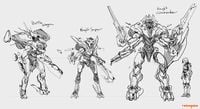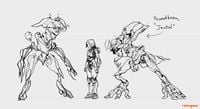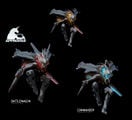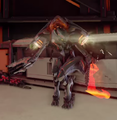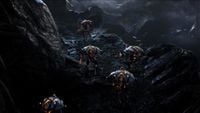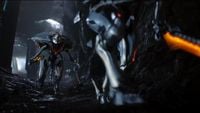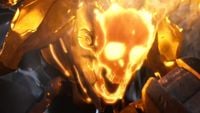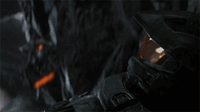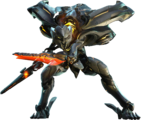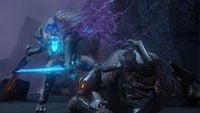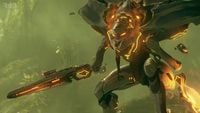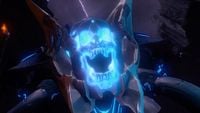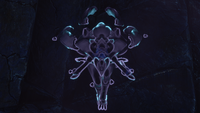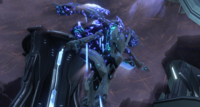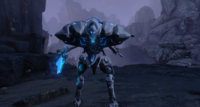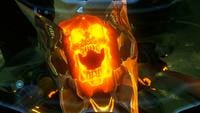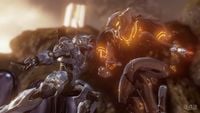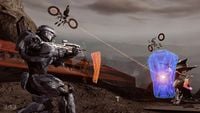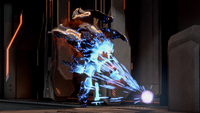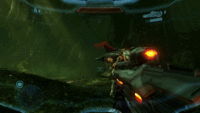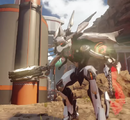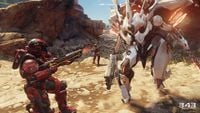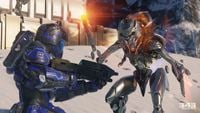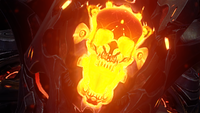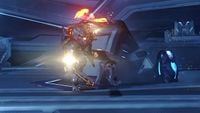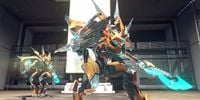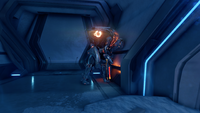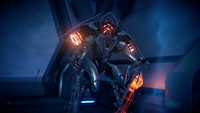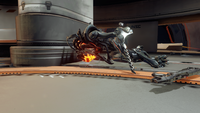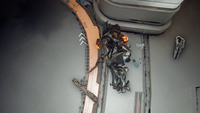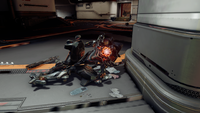Promethean Knight
From Halopedia, the Halo wiki
| Promethean Knight | |
|---|---|
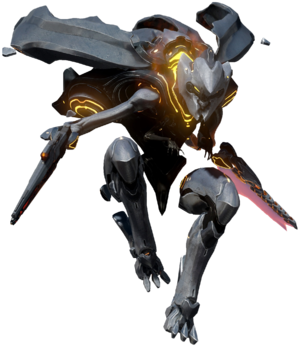
| |
| Overview | |
|
Role: |
Defense, elimination of threats |
|
Manufacturer: |
|
|
Height: |
302.3 cm (9 ft 11 in)–328.5 cm (10 ft 9.3 in)[2] |
|
Mass: |
|
|
Armament: |
|
|
Armor: |
|
|
Energy shielding: |
Energy shield-equipped |
- "I have led you, my Prometheans, for thousands of years, and I shall continue to lead you. Rise! Rise, and protect the Forerunners! Rise, and protect the galaxy!"
- — The Didact to his legions of newly created Promethean Knights[5]
Promethean Knights are a class of armiger, or mechanised Forerunner warrior, created by the Ur-Didact toward the end of the Forerunner-Flood war to combat the Flood. They are named for their origins in the Prometheans, one of the highest and most well-respected groups in the rate of Warrior-Servants; the first Promethean Knights were created by composing the Forerunner Prometheans, sublimating their consciousness into robotic form in the hopes of creating an infantry force that would be immune to Flood infection. Despite this, there were still too few Promethean Knights to make a meaningful difference in the progress of the war, leading to the Didact instead turning the Composer on ancient human populations and creating an army of beastial machine-soldiers enthralled into his service.[3]
After the Librarian exiled the Ur-Didact on Requiem for this act, several legions of these constructs stationed on the shield world went dormant for the next 100,000 years. The machines—as well as their master—were reawakened in late 2557, when John-117 and the United Nations Space Command stumbled upon Requiem.[6][3] By 2558 they, along with several other Promethean constructs, had fallen under control of the Created led by Cortana, who believed the artificial intelligences were the rightful heirs of the Mantle of Responsibility, not humanity.[7]
Overview[edit]
Design details[edit]
The Promethean Knights are bipedal, fully weaponized mechanical warriors designed to operate and eliminate threats in a wide variety of environments.[6] While the Knights are fully machines, their AI is a result of organic minds transformed into software format via a device called the Composer, unlike the Crawlers or the sentinels which are completely artificial in origin.[2] Similar to the other Promethean constructs, as well as some earlier types of Forerunner military automatons,[8] Knights have a number of insectoid attributes; they produce noticeably insect-like clicking sounds and tend to make spasmodic movements, especially when idle. Additionally, their carapace resembles that of an insect and possesses hatches resembling insect wings which frequently twitch and flutter seemingly at random; located on the "wings" are the Knight's anterior shield distributors.[2] Knights have two sets of arms; two large, artificial arms at each shoulder in which the weapons are mounted and two smaller arms below the shoulders. The larger arms are composed of separate segments held in formation through an energy field. Knights also have a comparatively smaller set with small, five-fingered hands. These smaller arms are more "organic" in shape and are physically attached to the Knight's body. Their main locomotion is provided by a pair of extremely powerful legs designed for agility and speed. Broad-set stabilizers support the large body and reinforced joints offer fluid movement despite the Knight's size and mass. At the back of their feet there is a counter-locking system for tactile balance.[2]
Knights are remarkably agile, and in addition to using their limbs for conventional movement they are also capable of translocating over moderate distances, allowing them to either swiftly retreat from the battlefield or to flank their enemies. Although not commonly seen in the field, Knights can also be deployed from warships and are equipped with thruster engines on the sides of their carapace for maneuvering. This capability was used near the end of the Forerunner-Flood war, when Knights were deployed to board and destroy Flood-controlled ships from within.[9]
The Knight's carapace is composed of smartmatter, a form of programmable matter held together by hard light bonds.[4] Upon taking critical damage, Knights completely disintegrate, a process that Cortana described as a "data purge."[10] Their bodies erode away from where the fatal shot was received and dissolve into glowing particles. After disintegration, a small ball of swirling light is left behind for a brief period; a Promethean Watcher can use this remnant to recreate and revive the Knight; however, an individual Knight can only be revived in this manner only once. If a Knight is destroyed, revived, and then destroyed again, the Knight's body disintegrates completely, leaving nothing behind. When a Knight is destroyed, it drops a weapon; after revival, it wields a weapon of the same type even if the first weapon was picked up.[11]
Knights are covered in patterns of light and have a fire-like glow around their heads. The color of this light usually indicates their allegiance. Those with blue lights are controlled or otherwise loyal to the Librarian or her remnant;[12] upon the Didact's release from his Cryptum the Knights' color changed to orange, indicating they had returned to his control.[10] The head features an armored helmet with glowing eyes and what appear to be grimacing jaws with rows of teeth. This helmet assembly can be retracted in two sections, revealing a glowing humanoid skull underneath.[11] Cortana initially theorized that this is because the Prometheans have mimetic capabilities, and had based the skull on scans taken of the Master Chief, though the skull may in fact be based on that of a Forerunner.
Knights carry a single Promethean Watcher sentinel in the back of their armored carapace, which can be deployed at will for combat support. The Watcher's AI is a low-level ancilla split off from the Knight's essence when the Watcher is deployed.[2] The Watcher can greatly improve the Knight's combat capabilities by raising hardlight shields, reviving fallen Knights, summoning Crawlers, building automated turrets, and flinging back enemy grenades while distracting them with its own weaponry.[11]
Creation[edit]
Unlike armigers and sentinels, Knights are not artificial intelligences, even despite their robotic exterior. They instead consist of a sapient mind converted into a software form by a Forerunner device known as the Composer. The conversion process is called sublimation, and is something the Forerunners never truly understood. The results of the Composer's work are essence imprints akin to high-level ancilla, with stored mentalities that are capable of being given individual localised consciousness by replicating their original brain's neural structure.[1] The digitised essences are stored in the Composer's Abyss aboard Installation 03 until they can be implanted in a Knight shell.[13]
While the Composer can be used on any living being with a sufficient enough complexity to resonate with it,[1] to-date, only three sources have ever been used for the creation of Promethean Knights:
- The original Forerunner Prometheans who willingly surrendered themselves to the Composer during the war against the Flood. These are limited in number and generally retain a greater, more stable form of individuality.[14]
- The two million humans harvested by the Ur-Didact on Omega Halo during the Flood war to bolster his army. These serve as more common and numerous thrall units.[14]
- The seven million humans of Ivanoff Station and New Phoenix harvested by the Ur-Didact in 2557; these are particularly prone to error - something speculated by Doctor Catherine Halsey to be the result of the sublimated minds resisting their unwilling enthrallment.[15][14]
The process of being sublimated and converted into a digital essence is a torturous and painful one, and cannot be reversed.[1] When applied to a living being, over the course of a few seconds their flesh is stripped from their bodies, followed by their musculature, internal organs and skeleton - leaving only dust behind.[16] This process does not discriminate, and will subject children to the same process as an adult.[17]
Armaments[edit]
Promethean Knights utilize a broad arsenal of weapons. For close-quarters combat, they are armed with a hardlight blade on one hand. Each class of Knight has a uniquely shaped blade, totaling six variations amongst them. They also use various Forerunner ranged weapons, such as Scattershots, Suppressors, LightRifles, Binary Rifles, and Incineration Cannons; their dedicated armament largely depends on their class and role. They frequently employ pulse grenades in combat, generating it from the arm-blade's joint.[2] Some subtypes also make use of autosentries, in addition to the support that they can already summon.[11]
Variants and ranks[edit]
Promethean Knights maintain a variety of design formats based on their specified purpose or defensive needs.[1] Knights consisting of sublimated Forerunner Prometheans are generally more stable and used for command roles, due to their experience, where human-derived Knights are used as more common thrall units.[14] In deployments, Knights are organised into schema led by a Strategos command pattern which manages the Knights' battle network, directs the force, and provides contextual information.[15] The ground deployments are then led by Knight Commanders.[3][18] During battle, Knights are assessed by the Strategos - those who are assessed to perform well may be promoted to Commanders - recieving a visual upgrade alongside greater access to the battle network.[15] A Knight's rank may also be determined by a combination of past military service and "popularity amongst their peer group".[19]
Alongside command authority ranks, Knight variants exist for specialised battlefield roles. During the Battle of Requiem and Requiem Campaign, the UNSC recorded three distinct classes of Knight alongside the standard Knights, though speculated there may be further variations for even more specialised roles.[3]
- Knight Lancer - a sniper variant equipped with long-range weaponry, greater mobility and enhanced tracking capabilities.
- Knight Battlewagon - heavily armored variant built for close-quarters combat.
- Knight Commander - command-and-control unit for Knight forces.
After the Didact's defeat in mid-2557, the Prometheans under Jul 'Mdama's command began to exhibit design differentiations from those found on Requiem, alongside similar functionality upgrades to their weaponry.[20][21] These changes were first reported by the UNSC during Jul 'Mdama's attack on Oban.[22] The eventual conversion of the Promethean Knight force from Covenant to Created control in the Created uprising of October 2558 saw these changes finalised as the Knights were brought under Cortana's control. Many of the AI who joined the Created were given the opportunity to house their data cores within Created Knights, though the severing of the Created's centralised network during the Battle for Zeta Halo the following year has left the operational status of these Knights - and their allegiances - unknown.[7]
Later in 2558, the UNSC encountered more Knight patterns and incorporated them into War Games simulations for Spartans to train in fighting against. These include:
Known Knights[edit]
- Forerunner-derived Knights
- Animus-To-Remain[14]
- Endurance-of-Will
- Habit-To-Sever[14]
- Lochagos[14]
- Malice-Begets-Demise[14]
- Ortus[14]
- Rive[14]
- Human-derived Knights
History[edit]
This extreme measure was intended by the Ur-Didact to create an unstoppable army, completely immune to Flood infection, near the end of the Forerunner-Flood war. The Didact's Promethean Warrior-Servants were the first Knights, but these were too few in number to turn the tide. Desperate for greater numbers and still refusing to accept the Halo Array as a final option, the Didact "conscripted" a large population of humans from Omega Halo to expand his army; this genocidal act was the ultimate reason the Librarian imprisoned her husband. Despite housing harvested human and Forerunner essences, the original personalities are no longer in evidence; the Knights are intelligent, but viciously ruthless in behavior and seemingly lacking any form of free will.[9]
Trivia[edit]
- Promethean Knights are "voiced" by Tasmanian devils.[23]
- Promethean's small manipulator hands are connected to their bodies, but their weapon arms and legs float free of their body. The legs (as opposed to some form of anti-gravity device) nevertheless seem to support their weight because the body sways and moves in response to the Prometheans' heavy footsteps.
- The Knight's helmet closely resembles a hornless FOTUS helmet.
- If a Knight boards a vehicle, it can only melee.
- The illustration of the Dazreme provided in the Halo Encyclopedia (2022 edition) depicts the Dazreme wearing a Knight's helmet on their head.
Gallery[edit]

|
See our gameplay information related to Promethean Knight on its gameplay page. |

|
Browse more images in this article's gallery page. |
Concept art and illustrations[edit]
Early concept art of the Knight for Halo 4, showing a much more mechanical design.
Promethean Knights attack Blue Team on Installation 03 in 2557 in Halo: Escalation.
TDS-009 kicking a Sangheili Zealot during the Battle of Aktis IV in 2558.
Concept of modified Promethean Knights for Halo 5: Guardians.
Promethean Knights engaging Blue Team on Installation 03 in Halo Mythos.
Concept art of Promethean Knights attacking Red Team for Halo Wars 2.
Screenshots[edit]
A group of Knights on patrol in Scanned. Note the Watchers being stored in the back of their carapaces.
A Knight dispatches a Commander.
A Spartan-IV engaging a Knight in close quarters.
An animated image of a Knight Lancer translocating.
The Ur-Didact, surrounded by his newly-created Promethean Knights.
Knight Strategos on Escape from ARC.
Red team faces off against Strategos in Warzone.
TDS-009 bangs the walls of its cell on Genesis.
List of appearances[edit]
- Scanned (First appearance)
- Halo 4
- Halo: Silentium
- Halo: Escalation
- Halo: Spartan Strike
- Halo 5: Guardians
- Halo Mythos
- Halo: Tales from Slipspace
- Halo: Epitaph
- Halo: The Machine Breaks
- Halo Infinite (Mentioned only)
- Halo: Fifth Canticle
Sources[edit]
- ^ a b c d e f Halo Encyclopedia (2022 edition), page 322-333
- ^ a b c d e f g Halo 4: The Essential Visual Guide, page 54-57
- ^ a b c d e Halo Waypoint, Promethean Knight (Retrieved on Oct 27, 2015) [archive]
- ^ a b Halo: Warfleet, page 83
- ^ Halo 4, Terminal #5
- ^ a b Halo 4 Official site, Characters: Promethean Knights (Retrieved on Dec 25, 2012) [archive]
- ^ a b Halo Encyclopedia (2022 edition), page 397
- ^ Halo: Cryptum, chapter 32
- ^ a b Halo 4, Terminals
- ^ a b Halo 4, campaign level Forerunner
- ^ a b c d Halo 4, Knight in-game enemies
- ^ Halo 4, Terminal #7
- ^ Halo: Escalation, issue 8
- ^ a b c d e f g h i j Halo Waypoint, Canon Fodder - Decennial Delights (Retrieved on Sep 17, 2024) [archive]
- ^ a b c d e Halo: The Machine Breaks
- ^ Halo 4, campaign level Composer
- ^ Twitter, Joshington (@joshingtonstate): "@JoshingtonState I just read something creepy in the forums, but what happens with the composed children? Do they become Knights as well?
@ShadowDRAC086 indeed" - Josh Holmes (Retrieved on Jul 24, 2014) [archive] - ^ Halo 4: The Essential Visual Guide, page 56
- ^ Twitter, Joshington (@JoshingtonState): "@ShadowDRAC086 rank is based on a combination of past military service and popularity amongst their peer group." - Josh Holmes (Retrieved on Apr 26, 2014) [archive]
- ^ Halo Waypoint, Canon Fodder - Locke & Load (Retrieved on Dec 23, 2019) [archive]
- ^ Halo 5: Guardians, REQ Card: Boltshot "Burst-fire energy pistol. Bolts home-in on close range targets. This new functionality appears to be related to other adaptions the Prometheans have displayed since the disappearance of the Didact."
- ^ Halo 5: Guardians, campaign level Osiris: "New kind too. Like they reported on Oban." - Holly Tanaka
- ^ Halo 5: Guardians marketing, The Sprint campaign, The Sprint: Composer
| ||||||||||||||
